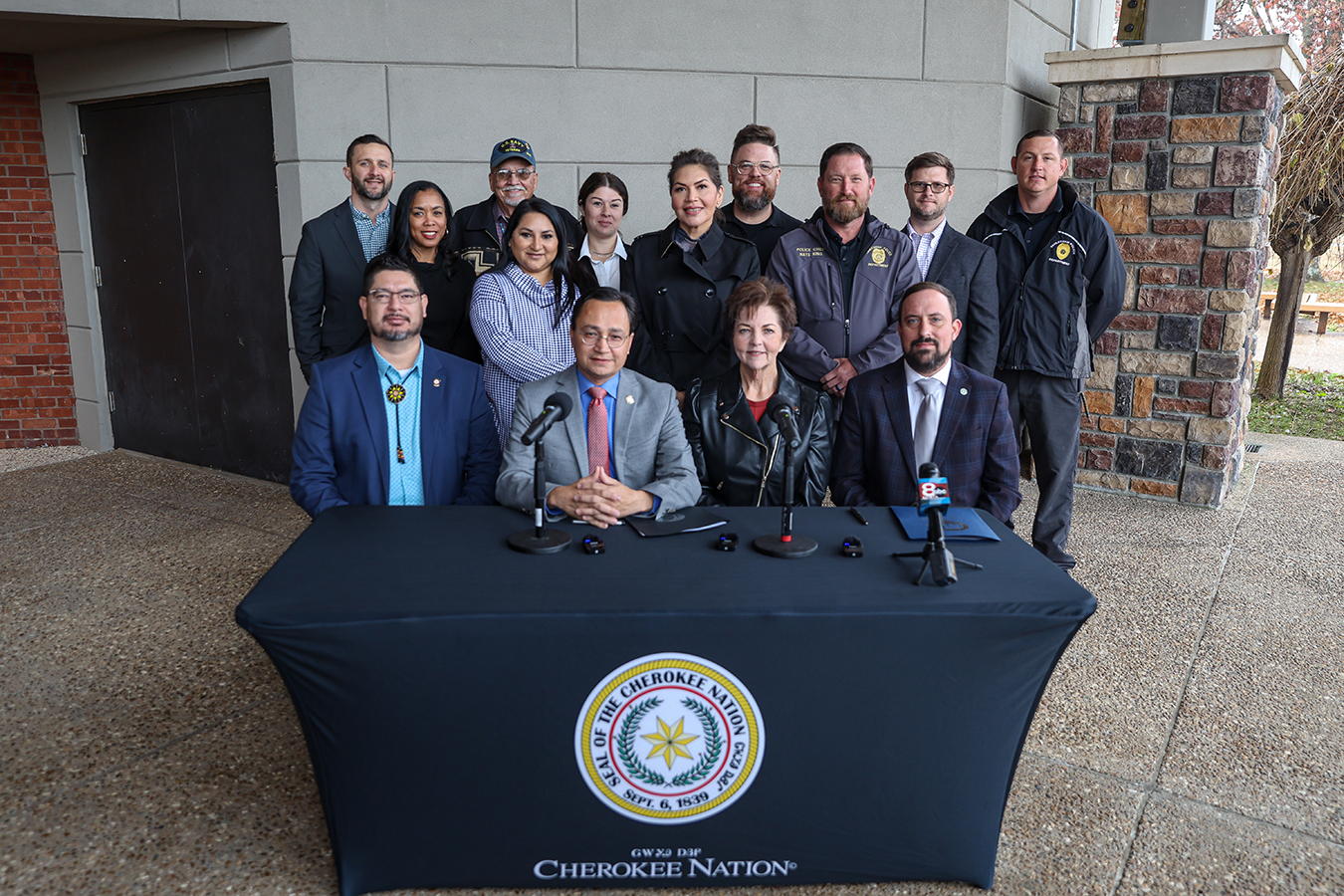TAHLEQUAH, Okla. — The Cherokee Nation signed an agreement with the city of Tahlequah on Thursday that acknowledges the tribe’s intent to share revenue from traffic citations with city officials.
Tahlequah, the capital of the Cherokee Nation, is the 30th municipality within the Cherokee Nation Reservation to sign such an agreement with the tribe, ensuring the city does not lose funding sources after the historic U.S. Supreme Court’s McGirt ruling and the 10th Circuit’s more recent Hooper decision.
Under the agreement, the city of Tahlequah will collect fines from traffic tickets given to tribal citizens in the city limits and keep all but $30 from each ticket.
“The Cherokee Nation believes in partnerships especially when it comes to public safety, and it’s great to partner in our hometown,” Cherokee Nation Principal Chief Chuck Hoskin Jr. said. “This agreement with the city of Tahlequah allows them to retain revenue from traffic tickets, making the process more efficient and meeting our overall objective of making sure we work as a team for Cherokee citizens and non-citizens alike, as we all take on this very important responsibility of protecting citizens. This agreement is one of 30 that we have now signed across the reservation, and we hope more municipalities come on board.”
Under the agreement, the city of Tahlequah will be able to retain fees and fines associated with traffic stops of Native citizens, in recognition and exchange for the policing and administrative functions provided by the municipality.
“This agreement with the Cherokee Nation greatly strengthens our partnership, placing utmost importance on ensuring public safety for all citizens of Tahlequah," stated Tahlequah City Mayor Suzanne Myers. "Our city is experiencing remarkable growth, and with this agreement in place, we can confidently maintain our revenue from traffic citations, ensuring that Tahlequah continues to flourish. We deeply appreciate and value our partnership with the Cherokee Nation, and we are excited to embark on this progressive agreement."
Every policing agency within the Cherokee Nation Reservation has a cross-deputization agreement with the Cherokee Nation, which allows for the continued enforcement of laws, including traffic violations. Most of these agreements have been in place for decades.
“All around, we have a shared responsibility when it comes to public safety. This agreement with the city of Tahlequah allows the city to maintain revenue for its needs,” Deputy Chief Bryan Warner said. “We want to make sure that people understand how much we value our government-to-government relationships because it is very important that we continue to partner with our neighbors across the reservation.”
Other cities to sign municipality agreements with the Cherokee Nation to retain the fees and fines for traffic citations issued to Native Americans include: Adair, Bernice, Chelsea, Chouteau, Colcord, Foyil, Gans, Gore, Hulbert, Jay, Kansas, Locust Grove, Marble City, Muldrow, Muskogee, Owasso, Porum, Pryor, Salina, Stilwell, Talala, Verdigris, Vian, Vinita, Warner, Watts, West Siloam Springs and Westville.
Across the 7,000-square-mile Cherokee Nation Reservation, citizens of tribal nations are subject to Cherokee Nation laws relating to a variety of matters, including public safety laws, Chief Hoskin said.
“Irrespective of whether we have an agreement of any sort in place in any particular community within our reservation, it is important to understand that Cherokee Nation has a comprehensive criminal code substantially similar to the state of Oklahoma’s code,” Chief Hoskin added. “This means that wild and irresponsible claims that tribal citizens are not subject to traffic laws are simply false.”
The formal signing between the Cherokee Nation and the city of Tahlequah follows the 10th U.S. Circuit Court of Appeals ruling in the Hooper v. City of Tulsa case, which reaffirmed that state and municipal agencies do not have jurisdiction over municipal violations committed by tribal citizens within tribal reservations.

